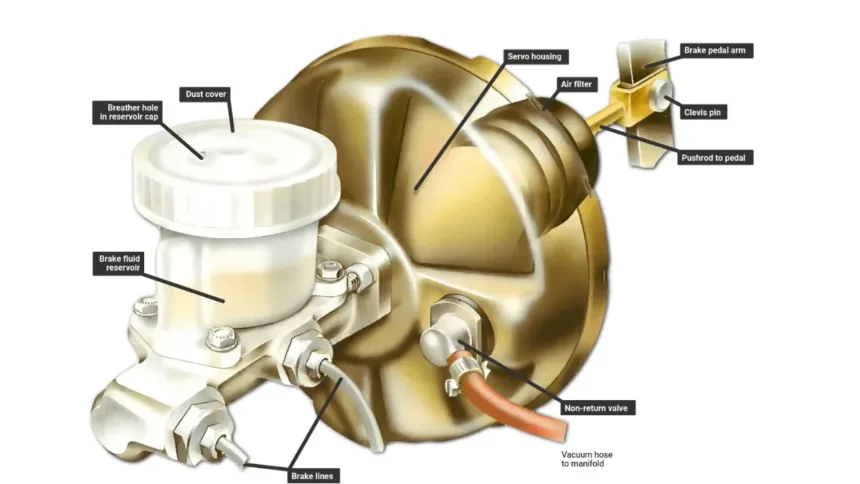The master cylinder is perhaps one of the most important components within your car’s braking system. The master cylinder is always used crucially when you press the brake pedal for your vehicle to stop. If you have an idea of how this works, then the mechanics of the master cylinder can be very well understood. But just how does this device work, and why is it so important? Let’s look into the functionality and importance of a master cylinder.
Introduction to the Master Cylinder
It’s like the heart of the braking system for the car. Without it, not much would happen with that pedal pressed. In essence, this is supposed to change the pressure of your foot on the brake into hydraulic pressure to be used to activate the brakes on your wheels. Think of it as an intermediary between your foot and the brake calipers.
What is a Master Cylinder?
Overview and Definition
The master cylinder is a fluid-filled housing whose functionality is based upon hydraulic pressure, transferring the stop request from the brake pedal onto the brakes themselves. It is usually mounted under the hood against the brake booster and works in tandem with the rest of the braking system to ensure that you can stop your car efficiently.
Types of Master Cylinders
Major types of master cylinders are usually divided into single-piston and dual-piston.
Single-Piston Master Cylinder
With older cars, though, you most likely would get just one single-piston master cylinder. Such is a design where there is just one piston to actuate all the brakes on the car. Simple but not so safe because, if that single piston fails, you could lose all ability to brake.
Dual-Piston Master Cylinder
Most modern cars use dual-piston master cylinders. This design adds redundancy—each piston controls a different set of wheels, usually front and back. If one piston fails, you’ll still have brakes on two of the four wheels, making it much safer.
Function of the Master Cylinder in Braking System
What does the master cylinder do, then? Well, this basically creates the pressure that is transferred to your brake calipers. Pressing the brake pedal makes the master cylinder force brake fluid into the brake lines, and the pressure goes on to the calipers, which cause your car to slow down.
How Hydraulic Pressure Works in a Master Cylinder
The working principle is based on hydraulics. Every time one steps on the pedal to apply the brakes, it presses one piston inside the master cylinder. It will, hence, push the fluid through the lines towards the brake calipers at each wheel, developing pressure there. This hydraulic pressure finally gives stopping power to your brakes.
Brake Fluid: Lifeblood of the Master Cylinder
Braking fluid plays a major role in the working of the master cylinder. It provides a medium for that force to be transferred from your foot to the brakes. Fluid is filled into a reservoir in the master cylinder and must be kept at a safe level for its proper working. Over time, the brake fluid absorbs moisture and loses its effectiveness; therefore, it has to be changed every now and then.
How Master Cylinder is Connected to the Brake Pedal
It is directly connected to the master cylinder. When depressing the pedal, a rod attached to the pedal presses on the piston in a master cylinder, brake fluid compresses, and hydraulic pressure surges through the system to apply the brakes. In effect, it is essentially a direct mechanical linkage that changes the motion of your foot into force that stops your vehicle.
Why is the Master Cylinder Important to Safe Driving?
Should that master cylinder have failed, then, essentially, you would never have been able to stop your car. The master cylinder makes sure the hydraulic pressure in the braking system gets distributed correctly so as to help you keep proper control over your vehicle on the road. A defective master cylinder may result in longer stopping or failure in the action of the brakes completely – a terribly unsafe situation.
Reaction of the Master Cylinder when You Press the Brake
Hit the pedal, and the master cylinder leaps into action. The piston inside the cylinder merely shoves the brake fluid, thus forcing the liquid into the hydraulic pressure needed to turn on the brakes. Press harder on the pedal, and the master cylinder delivers more pressure-hence quicker stopping times.
What Happens if the Master Cylinder Fails?
Failure of this master cylinder is a serious safety issue, since its complete failure will render a driver’s inability to apply his brakes, placing themselves and other persons at risk on the highway. Common symptoms of failure are when there’s sponginess in the brake pedal, poor brake action, and apparent brake fluid leaks.
Signs of a Bad Master Cylinder
Recognizing signs of a failing master cylinder could save you from a potential accident. Following are a few of the common warning signs:
Spongy Brake Pedal
This implies that when air enters the hydraulic system, or the master cylinder is about to fail, the pedal will feel soft or spongy.
Brake Fluid Leakage
Anything leaking around the master cylinder should be regarded as a red flag warning. Low master cylinder reservoir fluid levels will only make it tougher to apply the brakes.
Poor Braking Performance Defects in the master cylinder may show when there is some delay in the stopping process of the car, or when quick response to the pedal diminishes.
Common Misconceptions About the Master Cylinder
One common misconception is that the master cylinder only affects the front or rear brakes. In reality, it controls the entire braking system. Another myth is that you can drive safely with a failing master cylinder. This is highly dangerous and can lead to brake failure.
FAQs About Master Cylinders
1. What happens when the master cylinder fails?
When the master cylinder fails, you may experience a spongy brake pedal, poor braking performance, or even total brake failure.
2. How often should I replace my master cylinder?
Master cylinders typically last for many years, but if you notice signs of wear or failure, you should replace it as soon as possible.
3. Can I drive with a bad master cylinder?
Driving with a failing master cylinder is highly dangerous and can lead to brake failure. It’s important to get it fixed immediately.
4. What are the signs of air in the master cylinder?
A spongy or soft brake pedal is often a sign that air has entered the hydraulic system.
5. How much does it cost to replace a master cylinder?
The cost of replacing a master cylinder varies but typically ranges from $300 to $600, depending on the make and model of your vehicle.
Also Read : Top 10 Most Reliable Cars in the USA Over the Past Decade







